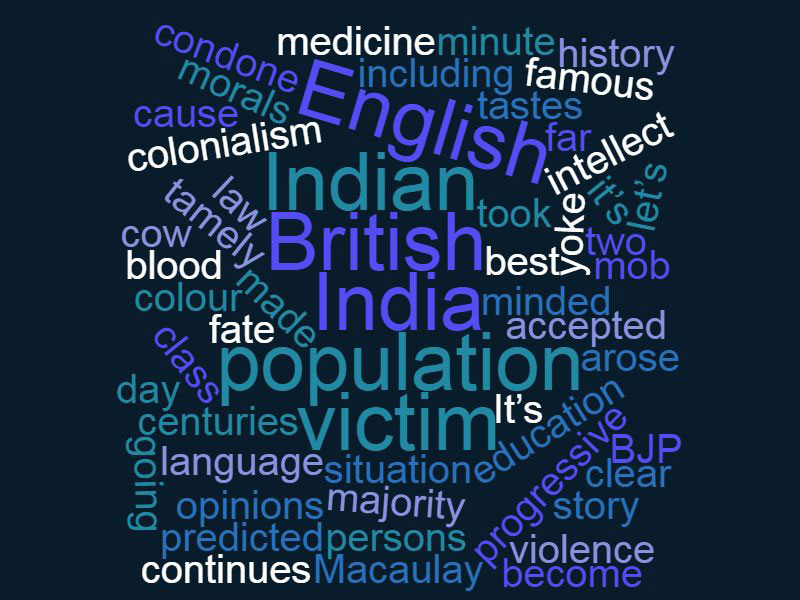My first brush with it was when I was a small boy, listening to my grandmother (only half-joking) lament the woes of the Indian cricket team (pathetic in those days). Her take was that consumption of meat by foreign teams placed them way above Indians. Actually, it was much like the experience of the young Mohandas Gandhi, who came to believe, for the same reasons, in the superiority of his Muslim friend.
The widely-trumpeted Indian proclivity for vegetarianism is the foundation of the victim story. It persists to this day under the BJP government, which continues to condone mob violence against the meat-eating population, purportedly in the cause of cow protection. It’s the type of dog-whistle politics that has become the hallmark of public affairs in India.
But let’s not digress. Without going too far down the highways of history, it’s clear that for nearly two centuries, India was a victim of British colonialism. The majority of the population tamely accepted it as the yoke of fate. But the more progressive minded made the best of the situation: they took to British education, the English language, the professions including law and medicine. From them, as Macaulay had predicted in his famous minute, arose “a class of persons Indian in blood and colour, but English in tastes, in opinions, in morals and in intellect”.
While Macaulay found no favour with the political class in India, the fact remains that it was from this class of people that arose first the Home Rule, and later the freedom movement. The Indian nationalist movement broke the back of British colonialism in India with its innovative protests and charismatic leaders. No victim mindset here but instead, a confident assertion of a people determined to wrest freedom from foreign rule. Its success spawned copycat freedom movements around the colonial world and spelled the end of European manifest destiny: the white man’s burden, control over the non-white world.
Away from the heady sweep of India’s independence movement, proponents of victimhood nevertheless lurked in dark corners — grim and dour men steeped in caste and religious bigotry. These Hindu fundamentalists took no part in the struggle against colonial rule. Instead, they supported the British colonial government against the nationalists, afraid of their confident vision and inclusive prescriptions. Not for them the secular ways of the freedom fighters.
In the event, the nationalists fired the imagination of the Indian masses and the British were vanquished. But not before they played their last card of skullduggery: some diehards in the British government of India actively encouraged rivalry between the Indian National Congress and the Muslim League, hoping to delay the inevitable so they could enjoy the plush life of colonialists a little longer. This rivalry festered and led to a grisly aftermath. The Partition of British India into India and Pakistan had no precedent; the scale of dislocation and violence was pure evil.
But it gave hope to unreconstructed Hindu fundamentalists harbouring deep hatred for nationalists. As such, they chose to back the colonial diehards who widened the chasm of religious division in India. The legacy of Partition was a pernicious animosity between Hindus and Muslims. This suited the bigots and fed their dark vision of victimhood. Opportunists as ever, they launched a whisper campaign among the victims of the India-Pakistan divide, pointing fingers at the secular nationalists as the cause of their tragedy and suffering.
As India blossomed into a democratic republic, the Hindu victim movement kept religious hatred alive. Every now and then, it would boil over into what came to be called communal violence, when actually it was instigated mayhem. Over the years, the men behind communal violence realised it could be used to build a political constituency.
The rest, as they say, is history. Today, the Hindu fundamentalists rule over India with a brute majority. They tolerate no dissent. They are flush with funds. They are seemingly unstoppable. Even so, they haven’t been able to exorcise the demons of victimhood. They still point to the diminished secular forces and hold it responsible for their inability to govern. They continue to feel embattled, especially now that things seem to be slipping out of control. Their narrative: for 70 years, we’ve been victims of this pseudo-secular movement that still exercises a grip over the public imagination; we won’t rest until India is wiped free of the influence of the secular liberal intelligentsia.
These victim victors still rail against the three ‘M’s’: Marxists, Muslims and Macaulayites. While they have managed to subdue the first two, they still have their hands full with Macaulay’s children, uncompromising liberals who have no time for what Jean-Francois Revel called “Marx or Jesus”.
(Rajiv Desai is president of Comma Consulting and a well-known Delhi-based columnist)
